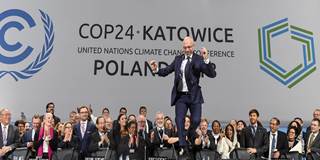As the deal struck at COP24 in Katowice shows, world leaders can address myriad shared challenges when they embrace compromise and cooperation. But they will also require something more: new ideas about how global governance should be organized.
MADRID – The last-minute deal struck at the United Nations Climate Change Conference (COP24) in Katowice, Poland, offers a glimmer of hope for the future not just of climate action, but also of global governance. After a year in which leaders reverted time and again to the failed policies of the past to address shared challenges, COP24 showed that there might still be room for innovative instruments for responding to common threats. To navigate the current era of global turbulence, the world will need forward-facing ideas. Looking backward will get the international community nowhere.

MADRID – The last-minute deal struck at the United Nations Climate Change Conference (COP24) in Katowice, Poland, offers a glimmer of hope for the future not just of climate action, but also of global governance. After a year in which leaders reverted time and again to the failed policies of the past to address shared challenges, COP24 showed that there might still be room for innovative instruments for responding to common threats. To navigate the current era of global turbulence, the world will need forward-facing ideas. Looking backward will get the international community nowhere.